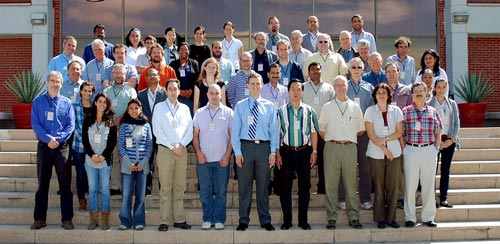 Hot models were the main topic of conversation at El Batan during 19-21 June 2013, when international experts from 18 leading research institutions participated in a workshop on “Modeling Wheat Responses to High Temperature.”
Hot models were the main topic of conversation at El Batan during 19-21 June 2013, when international experts from 18 leading research institutions participated in a workshop on “Modeling Wheat Responses to High Temperature.”
This workshop was organized by CIMMYT’s Wheat Physiology group and funded by the CGIAR Research Program on Climate Change, Agriculture and Food Security (CCAFS) in collaboration with the Agricultural Model Intercomparison and Improvement Project (AgMIP).
One key goal of CCAFS and AgMIP is to enhance global climate change impact assessment and adaptation capacity.
This workshop focused on understanding where and why crop simulation models diverge in their simulation of wheat responses to high temperatures. According to one of the workshop organizers, CIMMYT post-doc Phillip Alderman, “Previous studies by AgMIP-Wheat showed that temperature effects are one of the largest limitations in modeling the impacts of climate change. We hope that this workshop will enhance our understanding of wheat responses to high temperatures and facilitate further discussions on improving modeling to predict climate change impacts on wheat.”
The AgMIP-Wheat team will now embark on a systematic analysis of temperature response algorithms, as well as continuing their evaluation of wheat models, using CIMMYT wheat physiology data from high temperature environments.
This research is expected to instigate better policy decisions aimed at improving the food security of thousands of smallholder farmers in least-developed countries who depend on wheat as a staple food and who are most likely to be impacted by climate change.
 Capacity development
Capacity development